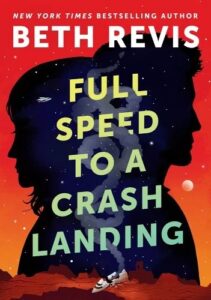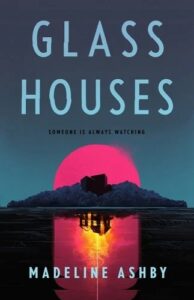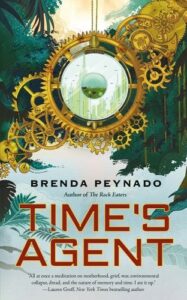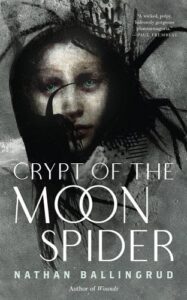
Pocket Universes, and a Villainess to Root For: August’s Best Sci-Fi and Fantasy Books
Stack your summer with new reads from Nalo Hopkinson, Madeline Ashby, Beth Revis, and more
At this point it’s not even grimly funny how much SFF is set within a world ravaged by climate change—it’s basically not a speculative setting anymore. Yet take some respite in this month’s last round of summer reads, which offer escapes within escapes: to one of the last verdant botanical gardens, to a beloved epic book series that might be the only way to stave off terminal cancer, to dreamscapes that will allow you to wake up as someone entirely new. From trippy short story collections and romantic space novellas to meta fantasy adventures and deliciously dark tech thrillers, August’s SFF offerings are as transporting as ever.
Beth Revis, Full Speed to a Crash Landing
(DAW, August 6)
I’ve been a Beth Revis fan since her YA generation ship thriller Across the Universe, so of course I’m excited to see her venture back into space for a heist-y sci-fi romance. The first novella kicking off the Chaotic Orbits trilogy, Full Speed to a Crash Landing smashes together spaceship looter Ada Lamarr and government agent Rian White. While straddling opposite ends of interstellar law, they can’t ignore the spark that might make one of them choose to switch sides… assuming, of course, that each is telling the truth about their motivations for their spaceshipwreck meet-cute. (The next installment, How to Steal a Galaxy, publishes in December.)
Ruben Reyes Jr., There Is a Rio Grande in Heaven
(Mariner Books, August 6)
Ruben Reyes Jr.’s collection of surreal short fiction centers on transformation, specifically involving the people and the land itself of El Salvador: an abuela becomes a marionette, the U.S. government resurrects migrant workers from a disturbing source, and history itself shifts as Reyes envisions an alternate timeline in which Spanish conquistadors were driven out of Central America. These stories range from amusing to downright chilling, but all command your attention.
Helen Phillips, Hum
(S&S / Marysue Rucci Books, August 6)
Chances are that if you’re reading this, you’re probably worried about AI stealing your job. But would you be willing to alter your own face to keep your family afloat? That’s May’s desperate bid in Helen Phillips’ dystopian near-future novel, in which climate change and robots known as “hums” simultaneously encroach on humans’ happiness and security. When May attempts to treat her husband and children to a three-night stay in the rare remaining botanical garden, their unwillingness to go device-free for three days only widens the chasm between them and her. But it’s not until her family is in genuine danger that May will do the unthinkable, working with a hum despite it representing a future that could negate her present.
Madeline Ashby, Glass Houses
(Tor Books, August 13)
Opening in media res with a private plane full of tech employees crash-landing on a remote island, Madeline Ashby’s Glass Onion-esque thriller starts as throwing shade on supposed tech geniuses—especially when you’re Chief Emotional Officer (oof) Kristen, who must manage her boss Sumter even more in the middle of an emergency survival situation. Yet as the team on this unorthodox corporate retreat discover the eponymous glass house full of everything they supposedly need, including a sinister algorithm, Ashby brilliantly elevates the stakes. Without giving too much away, Glass Houses is really an indictment of the influencer parents who livestream their children’s entire existences—which could not be more perfectly timed to all of those Internet child stars coming of age right now. And it pulls no punches. I need you to know that there’s a moment right before the bloody climax in which I, juggling a newborn, just moaned, “Oh, noooo” in revolted fascination before rushing to the end. A must-read.
Brenda Peynado, Time’s Agent
(Tordotcom Publishing, August 13)
I would not have automatically connected the sci-fi subgenres of climate fiction and multiverses, but award-winning short fiction author Brenda Peynado has just that spark of genius with her new novella. Pocket universes are at the center of this pocket-sized story, in a future in which greedy corporations have of course found a way to “develop” (that is, destroy) these parallel universes in which time is slowed down or sped up. For archaeologist Raquel, the pocket universes are both a curse and a temptation; a tragedy from a lifetime ago has sent her biologist wife Marlena into a PW that Raquel wears around their neck, and led to their daughter Atalanta’s death. Offered the chance to fix everything, Raquel struggles with whether she even deserves the key to another pocket world.
Nalo Hopkinson, Blackheart Man
(Saga Press, August 20)
Nalo Hopkinson’s standalone fantasy delights in the tension between different states of being: Polyamorous scholar Veycosi longs to acquire the knowledge that will earn him a spot on Chynchin’s grand Colloquium, but the invasion of Ymisen ships demanding trade landlocks his intellectual explorations. At the same time, the eponymous Blackheart Man uses his demonic powers to resurrect an army frozen in tar, even as Chynchin’s children are rapidly disappearing. The parallels of these history-making events certainly sound like perfect fodder for an aspiring griot, or musician-historian, to complete his training…!
Nathan Ballingrud, Crypt of the Moon Spider
(Tordotcom Publishing, August 27)
With his first novel The Strange, and now this dark fantasy novella, Nathan Ballingrud is transporting pulpy gothic horror to outer space: respectively, Mars and the Moon, both set in an alternate-history 1920s-30s in which Earthlings’ space settlements include an asylum. Veronica Brinkley is one of many young women being treated for “melancholy,” and here’s where the titular Moon Spider comes in—its silk reaching into the amygdala makes for a gentler touch than a lobotomy, but just as invasive and devastating. But that’s not the only way that the doctors at the Barrowfield Home for Treatment of the Melancholy are spinning new webs in tribute to their arachnid idol.
 Sarah Rees Brennan, Long Live Evil
Sarah Rees Brennan, Long Live Evil
(Orbit Books, August 27)
A terminally ill character jumping through a portal fantasy in order to gain more time is a trope we’ve seen a number of times, most recently in Alix E. Harrow’s A Spindle Splintered… but rarely as the villain! That’s the darkly exciting new twist in Sarah Rees Brennan’s Long Live Evil, in which Rae tries to outrun death by jumping into her favorite fantasy book series. When she discovers that she has become Rahela Domitia, the antagonist to her beloved Once and Forever Emperor, she decides to embrace her villain era. Because if she’s going to die anyway, she might as well do it looking fabulous and doling out razor-sharp one-liners. As she joins a rogues gallery of medieval baddies with whom she bonds just as well (if not more) than your typical fantasy fellowship, Rae must find a way to survive past the end of someone else’s story.
Natalie Zutter
Natalie Zutter is a Brooklyn-based playwright and pop culture critic whose work has appeared on Tor.com, NPR Books, Den of Geek, and elsewhere. Find her on Twitter @nataliezutter.


























